With Mumbai University goofing up repeatedly on examinations and admissions, more colleges seem to want to go solo. But, it's not without financial risks
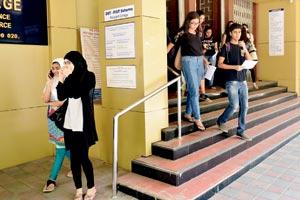
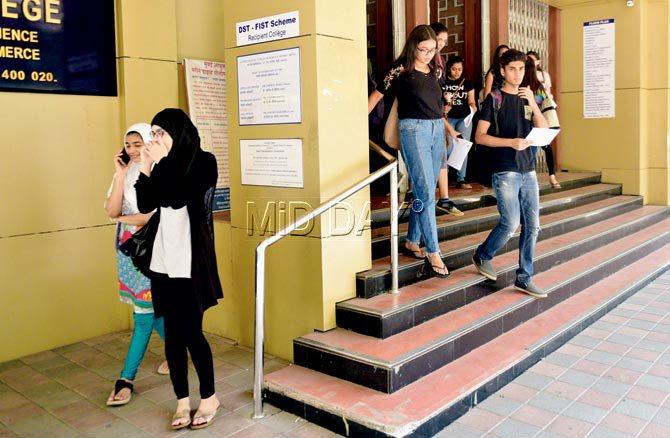
Jai Hind College at Churchgate was granted autonomy by UGC last month. It awaits a nod from Mumbai University. Pics/Bipin Kokate
Sitting in his cosy workspace at the Jai Hind College campus in Churchgate, Dr Ashok Wadia displays mixed emotions. On the one hand, there is triumph — his college was on the list of seven institutions in Mumbai (see box), which were granted autonomy by the University Grants Commission last month — and on the other, there is scepticism. "It's not time to celebrate yet," he says, showing restraint. "Autonomy is a huge challenge. It means responsibility and accountability in equal measure. Only three years into becoming autonomous, would we know if we've succeeded."
ADVERTISEMENT
While Jai Hind is awaiting a green light from the University of Mumbai (MU), which it is affiliated to, at the administrative level, work has begun in full swing. In fact, preparations started six years ago, when the college decided to take the plunge. The planning required approval from all the stakeholders — management, faculty, students and parents, says Dr Wadia. "This wasn't easy. Anything new is looked upon with trepidation. We needed to warm everyone to the idea, and alleviate those fears," he adds.
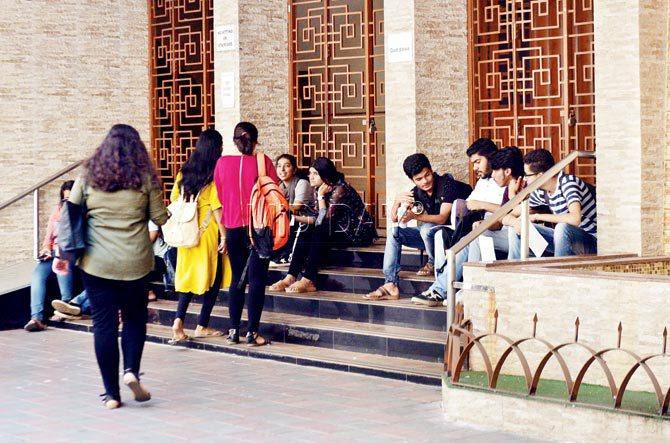
Jai Hind College as been granted autonomy by the University Grants Commission. However, it still awaits a nod from the University of Mumbai
For a long time now, higher education in India has mainly been under the affiliating system, wherein colleges are linked to a university, which prescribes the syllabus and organises and controls the evaluation system. Academic autonomy, as first suggested decades ago in the Kothari Commission (1964-66) and later incorporated into the statutes of many universities, including MU, allows colleges to determine and prescribe its own course of study and syllabi, the rules for admission, and evolve methods of assessing students' performance. While the final graduation degree is conferred by the parent university, with the academic umbilical cord cut, colleges get a free reign to improve on their quality of education.
That it is now the way forward for many colleges in Mumbai after Veermata Jijabai Technological Institute (VJTI) became the first MU-affiliated institution to get autonomy in 2004, is visible in the number of applications that both the UGC and the university have received in the last decade. During the term of former MU vice-chancellors Rajan Welukar (2010-15) and Sanjay Deshmukh (2015-17), over 10 of the 777 colleges affiliated with the university, including St Xavier's, Ramnarain Ruia and four KJ Somaiya institutions, were granted autonomy. Jai Hind and Mithibai in Vile Parle will soon join this prestigious lot, as the UGC cleared the decks for them last month, and a go-ahead from the MU is expected soon.
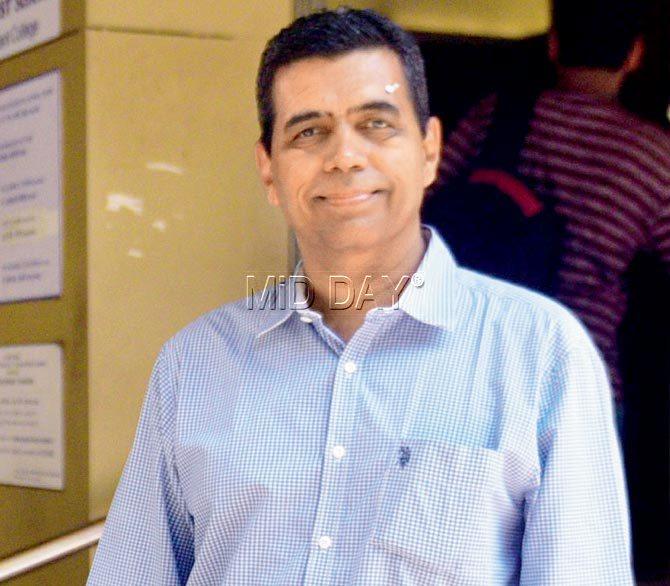
The college's principal Dr Ashok Wadia says they have been prepping for this for the last six years
But the stakes are high, and colleges in the city are being shown the mirror by their contemporaries in Delhi — home to the country's most premier institutions — who are currently, rallying a strong army of teachers and students to intensify the protest against autonomy. Mumbai's colleges, however, are determined not to be cowed down by these voices of dissent.
Need of the hour
Dr Suhas Pednekar, principal of Ramnarain Ruia Autonomous College, who on Friday was announced as the new VC of MU, insists that autonomy will help improve the quality of education. "In the affiliated system, the syllabus doesn't change for at least five years. Considering the world is changing so rapidly, we need to bring in relevance in what we teach in the classroom. At the same time, we also need to ensure that there is blending of skill and knowledge. Academic autonomy will give colleges the freedom to bring in requisite changes in the syllabi," he says.
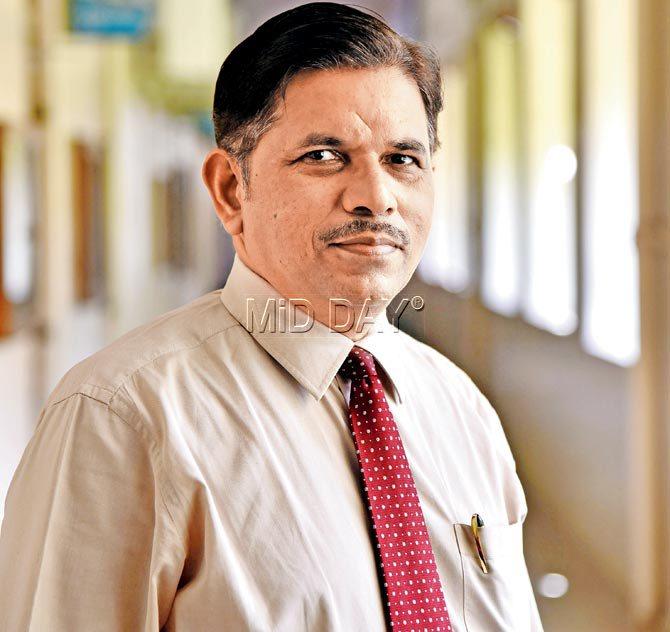
Dr Suhas Pednekar, principal of Ramnarain Ruia Autonomous College, also VC of MU. Pic/Pradeep Dhivar
Explaining why Sophia College applied for autonomy with the UGC and MU this month, principal Dr (Sister) Ananda Amritmahal, says, "At the moment, there are close to 800 colleges under the MU, and the university has to arrive at some kind of common denominator, which applies to everyone. In some areas the syllabus will appear too challenging, in other areas it could be easy. This, however, is not the best solution. Autonomy will help us work towards excellence, keeping our students in mind and how we could help strive for greater challenges."
That the colleges will get to decide on the evaluation process, will also help streamline the process. "If one looks at it pragmatically, the results will be declared on time and exams will be scheduled as per the calendar," says Dr Agnelo Menezes, principal of St Xavier's College, which became autonomous in 2010. "Another advantage is that, post the examination, a student is shown the paper. Not only does this give the student the opportunity for course correction, he/she is confident that this is genuinely their paper," he adds, while refraining from commenting on the royal mess at the university level in the last academic year.

St Xavier's College is autonomous since 2010. Principal Agnelo Menezes says that autonomy has helped them schedule exams as per the calendar, and declare results on time. "The other advantage is that, post the examination, a student is shown the paper. This gives the student the opportunity for course correction," he says
Some colleges, however, pointed out that the problems plaguing the university compelled them to take the decision to cut all academic ties with the MU. "The corrections this time have been random and appalling to say the least," said a principal, while discussing the on-screen marking mess. "In five papers one student got O (outstanding) grade, and in the other, he failed. How is it even possible? When we gave the answerpaper for re-evaluation, the same student had got an O grade again. And, last year the results were so delayed that some students lost scholarships to reputable universities abroad. It was heartbreaking," the principal added. "For our students' sake it was important to take the issue into our own hands."
How it helps
"Autonomy cannot be implemented unless the staff and students are on the same page as the management," says Wadia of Jai Hind. At St Xavier's and Ruia, workshops and training sessions are conducted periodically to teach staff newer approaches of teaching, designing the curriculum and assessing papers. Each department has a board of studies, comprising faculty, industry persons and students, which meets before the academic year and discusses how the syllabus can be tweaked. "In this way, the student also contributes to building of the course, as they are encouraged to meet their peers and actually find out what's happening in their areas of study and bring ideas back to the board," says Menezes.
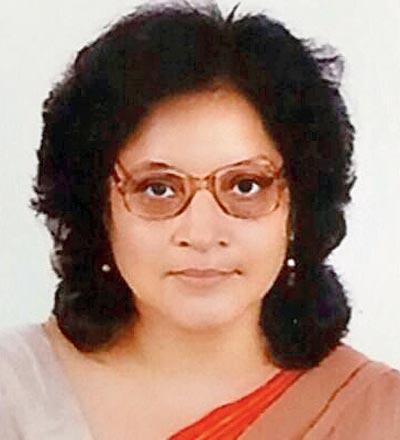
Nandita Narain, former Delhi University Teachers' Association president
As far as the syllabus is concerned, changes are introduced in a phased manner. "We can't get too ambitious, but we follow a very vibrant, ear-to-the ground approach," says Menezes, adding that they have to work with limited resources and faculty. For instance, St Xavier's, now in its eighth year of autonomy, veered only 10 per cent from the syllabus in the first cycle. "In the second cycle, we became more experimental and brought in 20 per cent changes," he adds. Some of the new courses in the college include leisure studies in sociology, forensic science in the life science department and understanding animal language in zoology. "When demonetisation happened, we immediately incorporated it into our curriculum. It would have taken years to do the same, had we not been autonomous," adds Menezes.
Dr Jessy Pius, associate
professor of the botany department at Ruia, which became autonomous last year, says the college has already started incorporating different ways of learning subjects. "For the biodiversity class, we are taking the students to natural forests in Yeoor and Matheran to understand conservation better. They are also given credits for the projects, which wasn't the case earlier," adds Pius, who is also the coordinator of the internal quality assurance cell of the college.
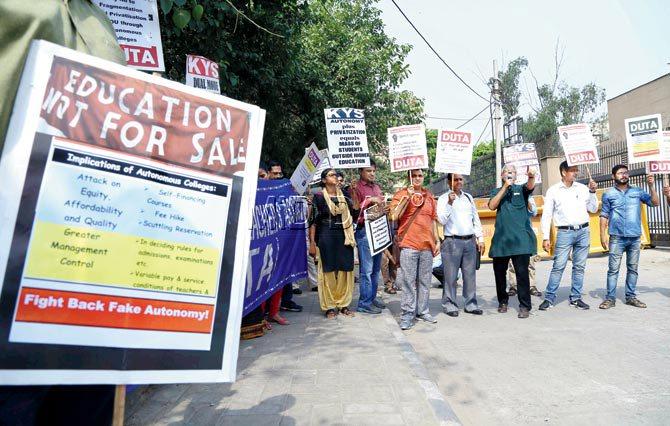
In Delhi, the teachers and students unions are staunchly against autonomy. Rajib Ray, president of Delhi University Teachers' Association (DUTA), who led the strike outside the UGC’s Delhi office on Friday to protest the move, feels that autonomous colleges show a lack of transparency and accountability in their functioning. Pic/Vijay Lakshmi
The challenges ahead
One of the biggest challenges for any autonomous college is the quantum of workload — it increases phenomenally, as handling of all tasks, both academic and bureaucratic, fall upon the faculty and staff. And, since the main criterion to be fulfilled when granting autonomy, is ensuring that the college conducts monthly assessment, teachers end up being flooded with a lot of evaluation work. "I could imagine that becoming a sore point," says Menezes. Dr Nandita Mangalore, associate professor of the life science and biochemistry department at St Xavier's explains that while the faculty has been given the freedom to look for alternative ways of evaluating students, when you are dealing with first year undergraduate students, the class is too large for anything but written tests.
"Aside from exam fatigue, the other grouse is that all the semesters' marks are crunched together to give you a final GPA. So, you can't fool around. A lot of dedication is required. And negligence by either staff or students is not tolerated," says Menezes. A student of second year Bachelor of Arts (SYBA) at St Xavier's admits that the continued internal assessment programme along with the semester examinations, has her on the edge through the year.
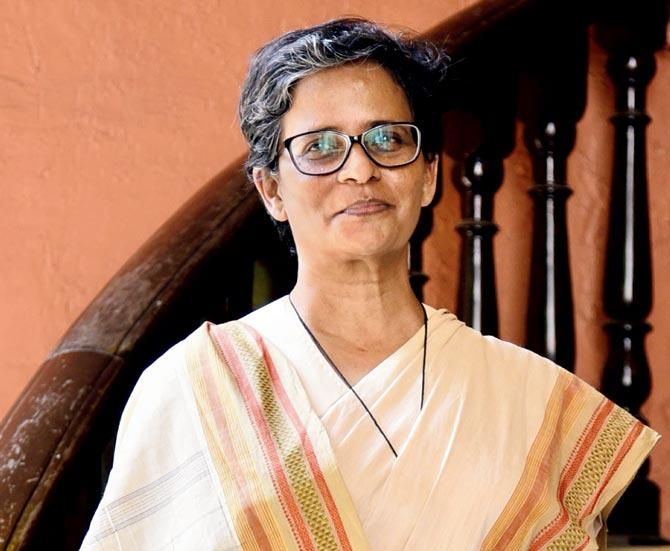
Sophia College applied for autonomy this month. The college's principal Dr (Sister) Ananda Amritmahal says it will help the institution design a curriculum keeping their students in mind
"There is a constant need to perform, and considering one needs to also put in 60 hours in the college's social involvement programme, the pressure is high. If you want to get a good GPA, you really need to push yourself."
The most important concern, however, is that of funds. While the UGC continues to support the colleges with salaried and non-salaried grant, the new courses are all self-financed. This problem has been augmented by the fact that there has been a hiring freeze on teachers by the state government. "We have to opt for contract-based appointments and that doesn't give stability in the fraternity or department," says a principal, on condition of anonymity.
Another principal pointed out how UGC has been holding back their annual grant of R20 lakh for the last three years. "While we have invested in enhancing our infrastructure, the money promised to us is not coming. We even went to the UGC office in Pune, only to be told that our file has been lost or a document has been missing. We've had to take a loan from the bank to run the college, all because of this bureaucratic dilly-dallying," the principal said.
None of the colleges have upped the fees for the UGC-funded courses, which vary from Rs 4,000 to Rs 7,000 every year. At Xavier's, the examination fee has led to a paltry three per cent hike in the overall fees. "Increasing fees would defeat the purpose of providing affordable, higher education to all. Yes, if and when, our students aren't able to afford the self-financed courses, we will come out with scholarships," says Wadia. Aware of the issue, Pednekar says, "Yes, good financial support is needed from the UGC to autonomous colleges."
Why is Delhi raging
In February, the UGC under the Ministry of Human Resource Development, released The Gazette of India, which stipulated fresh regulations — the UGC (Categorisation of Universities (only) for Grant of Graded Autonomy) Regulations, 2018 — for colleges. Accordingly, the Commission slotted universities into three categories i.e. Category I — accredited by National Assessment and Accreditation Council (NAAC) with a score of 3.51 or above, Category II — accredited by NAAC with a score of 3.26 and above, up to 3.50; and Category-III for scores below.
The regulations stated
that both, Category I and II Universities could "start a new course, programme, department, school, centre in disciplines that form part of its existing academic framework without approval of the UGC, provided no demand for fund is made from the government". A month later, in March, UGC announced that it had granted autonomy to 60 educational institutions. While Pednekar has described the UGC's move as "liberal" and stated that new guidelines "will motivate more colleges to take on autonomy", in Delhi, the opinions differ vastly.
"So far, the experience of autonomous colleges has been very poor. Autonomy has resulted in a sharp decline in the academic quality in the erstwhile prestigious colleges like Ravenshaw, Cuttack and Presidency, Kolkata, drastic rise in the cost of education, informalisation in faculty and staff appointments, adverse service conditions and pronounced commercialisation of courses and degree programmes. While government interference has not declined, the management has been given excessive powers to arbitrarily change rules relating to service conditions of teachers. There is a lack of transparency and accountability in the functioning of such colleges, leading to a mockery of the reservation policy, equity and access in higher education," says Rajib Ray, president of Delhi University Teachers' Association (DUTA), who led the strike outside the UGC's Delhi office on Friday to protest the move.
Nandita Narain, associate professor in the mathematics department of St Stephen's Delhi, and former DUTA president, says while the UGC has planned to extend autonomy to many, it isn't guaranteeing promotions, funds, revision of pay structure or working conditions. "This is just an attempt at withdrawing funding, and making education a commercially viable and privatised entity. Autonomy is an attempt at getting corporates to take over the otherwise, demoratic field of education."
Fahad Ahmad, general secretary of the students' union at Tata Institute of Social Sciences (TISS), says that if the UGC is really keen on providing autonomy it should be at three levels. "Yes, newer courses should be encouraged, but then they should ensure that funds are also increased and that the leadership of these institutions will not be determined by external forces." Despite repeated attempts, Vinod Tawde, minister for school education, higher and technical education, in the state, and DP Singh, chairman of UGC, remained unavailable for comment.
Former VC of MU, Rajan Welukar, who played a significant role in spearheading the movement of autonomy in Mumbai, can't wrap his head around the apprehension people are feeling. "Autonomy lends itself to freedom and innovative practices. The concerns that most teachers and students are raising, are issues felt across the country and not restricted to autonomous colleges only," he says.
Pednekar says that as new VC, he will take more interest in encouraging autonomy. "I will also do my best to facilitate a one-window system to fast-track the provision of autonomy to deserving colleges, and ensure that it is fully utilised by them." Ray of DUTA thinks this general apathy towards the real issues of autonomy among Mumbai colleges is because the Maharashtra government has greater stake in how state universities like MU function. "They [colleges] have probably suffered defeat long ago by the system. But, we are not giving up this fight yet."
Nine
No. of Mumbai colleges that sought autonomy in 2010-17
777
No. of colleges in Mumbai University. Out of these nine already have autonomy
2
No. of colleges that were recently granted autonomy by UGC — Jai Hind College and Mithibai College. The MU is yet to give its approval
 Subscribe today by clicking the link and stay updated with the latest news!" Click here!
Subscribe today by clicking the link and stay updated with the latest news!" Click here!







